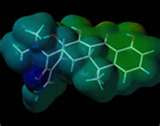
Chemicals can cause several different types of health problems.
What people don't seem to realize is that each time you spray yourself with a squirt of perfume, you are spraying chemicals directly on your body and into the air around you. After all, it takes chemicals to make perfumes. These compounds are called fragrance chemicals and they vaporize when sprayed into the air or on your skin. As you and others around you breathe in these scents you are being exposed to chemicals that may be harmful.

Perfumes can be complex and have up to hundreds of individual ingredients
Perfumed oils to extravagant designer perfumes are being developed on a regular basis. Currently there are upwards of 800 different fragrance chemicals and oils used in perfumes and scented candles. Added to this, over half of the ingredients used in perfumes have never been tested to see how toxic they are to humans. However, when we consider how some scented candles contain carbon monoxide, acetone, lead or benzene.It is not difficult to imagine how mixing a bunch of different chemicals together could affect our health.
Ingredients of concern!!!

Propylparaben:
~ the propyl ester of p-hydroxybthe propyl ester of p-hydroxybenzoic acid, occur as natural substance found in many plants and some insects, although it is manufactured synthetically for use in cosmetics, pharmaceuticals and foods.
~ it is a preservative typically found in many water-based cosmetics, such as creams, lotions, shampoos and bath products.
~ it will irritate your skin and can cause allergic reactions.

Tocopheryl Acetate:
~ also known as vitamin E acetate, is a common vitamin supplement with the molecular formula C31H52O3 (for 'α' form). It is the ester of acetic acid and tocopherol (vitamin E). It is often used in dermatological products such as skin creams.
~ is used as an alternative to tocopherol itself because the phenolic hydroxyl group is blocked, providing a less acidic product.
~ it will cause allergies and cancer.

Methylparaben:
~ is an antifungal that is widely used as a preservative for food, drugs and cosmetics. The compound is often found in carpules of local anaesthetic, acting as a bacteriostatic agent and preservative.
~ readily absorbed from the gastrointestinal tract or through the skin. It is hydrolyzed to p-hydroxybenzoic acid and rapidly excreted without accumulation in the body.
~ it will irritate your skin.

Tetrasodium EDTA:
~ used to sequester metal ions in aqueous solution. In the textile industry, it prevents metal ion impurities from modifying colours of dyed products.
~ most important chelating agents used in the separation of the lanthanide metals by ion-exchange chromatography.
~ it will linked to cancer problem and irritation of skin.

Diazolidinyl Urea:
~ is an antimicrobial preservative used in cosmetics. It is chemically related to imidazolidinyl urea which is used in the same way. It is also acts as a formaldehyde releaser.
~ used in many cosmetics, skin care products, shampoos and conditioners, as well as a wide range of products including bubble baths, baby wipes and household detergents.
~ it will causes nasopharyngeal cancer in humans.

What is the other problems caused by perfume?
- Sinusitis
- Headaches
- Nose and throat irritation
- Eye irritation
- Loss of coordination
- Defects of the central nervous system
- Birth defects
- Forgetfulness
- Cancer

~Help! I need the fresh air...


1 comment:
You need to focus more on the chemicals contained in the perfume and what are the effects of each chemical (if any) on human, etc.
Post a Comment